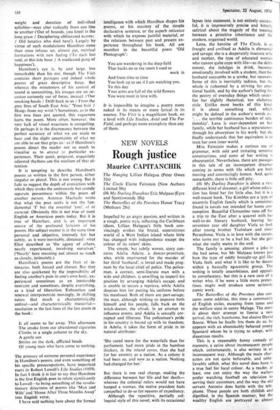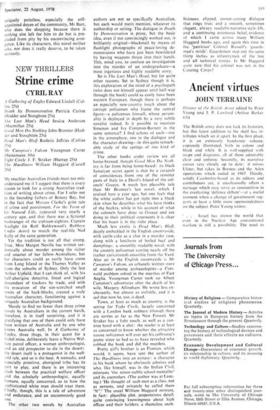NEW NOVELS
Rough justice
Maurice CAPITANCHIK
The Hanging Lillian Halegua (Peter Owen 32s) .
The Circle Elaine Feinstein (New Authors Limited 30s) Oh My Darling Daughter Eric Malpass (Eyre and Spottiswoode 30s) The Butterflies of the Province Honor Tracy (Methuen 28s) Impelled by an angry passion, and written in a rough, poetic style reflecting the Caribbean idiom, Lillian Halegua's little book con- vincingly evokes the brutal, superstitious world of a West Indian island where little has changed with independence except the colour of its rulers' skins.
The simple, but subtly woven, story con- cerns Adelia Adaire, a dancer-prostitute, who, while imprisoned for the murder of her third 'husband', is loved and made preg- nant by the local chief of police. The police- man, a correct, semi-literate man with a wife and children, is unwilling to imperil his position by arranging Adelia's escape, and is unable to- secure a reprieve, while Adelia despises him for putting his uniform before his manhood. Both of them are part-savage; the man, although wishing to improve both himself and his people, falls back on the witch-doctor, the obeah, in an attempt to influence events, and Adelia is sexually cor- rupted and illiterate. The policeman's pride in his country is bound up with its freedom; in Adelia, it takes the form of pride in its natural attributes:
'She cared more for the waterfalls than for parliament. had more pride in the bamboo thickets, in the inland coves, than she had for her country as a nation. As a colony it had been so. and now as a nation. Nothing had changed for her.'
But there is one real change, making the difference between her life and her death— whereas the colonial rulers would not have hanged a woman, the native president feels compelled to do so for reasons of expediency.
Although the repetitive, partially col- loquial style of this novel, with its occasional lapses into statement, is not entirely success fill, it is impressively precise and bitterh satirical about the tragedy of the meeting. between a primitive inheritance and the modern, organised world.
Lena, the heroine of The Circle, is as fraught and civilised as Adelia is elemental and savage; she is a desperately insecure wife and mother, the type of educated woman who cannot quite cope with life—as the debts mount, she indulges in drink, becomes emotionally involved with a student, then her husband succumbs to a stroke, but recovers. Some of this is inevitably tedious, but the whole is redeemed by a striving for emo- tional health, and by the author's feeling for the poetry of everyday things which under- lies her slightly rhetorical, too elaborate style. Unlike most books of this kind. it is about something real, which might be defined in the author's words as . . the terrible continuous burden of rela- tionship'. Lena is over-dependent on her family, while her husband has a separateness through his absorption in his work; but she finally understands that her equivalent is to trust her own inner world.
Miss Feinstein makes a curious use of grammar, with odd and irritating sentence constructions, and some of her writing is obscurantist. Nevertheless, there are passages in this tale of an incompetent dreamer coming to terms with life which are both moving and convincingly honest. And, quite remarkably, there is little self-pity.
Oh My Darling Daughter is about a very different kind of dreamer, a girl whose educa- tion has fitted her for little else, but it is a well-meant book. The Kimbles are a type of eccentric English family which is sometimes found in novels not intended for home con- sumption. Beautiful Clementine runs off for a trip to the East after a quarrel with her well-to-do literary husband, leaving her seventeen year old daughter Viola to look after young brother Trubshaw and sister Persephone. Viola is in love with the curate. who turns out to be a bad lot, but she gets what she really wants in the end.
The family is amusing. almost a joke in the bad sense, but Mr Malpass- knows just hot' the type of oddly brought-up girl like Viola feels. and what it is like to be decent within a basically egocentric group. The writing is totally unambitious, and appeals to complacency, but this is a rare case of a writer who, if he were a little more preten tious. might well produce some seriousi∎ comic work.
The Butterflies of the Province also con- cerns some oddities, this time a community of English exiles, escaping from taxes and the welfare state in sunny Malaga. The story is about their attempt to lionise a new arrival, the rich, handsome, but elusive David Boone. When he finally lets them do so. he appears with an abominably behaved young Spaniard whom he is trying to adopt, with disastrous results.
This is a reasonably funny comedy of manners, a satire about inconsequent people which, unfortunately, is also written in an inconsequent way. Although the main char- acters are not quite believable, and unbe-
lievably selfish, what this novel does have is
a true feel for local colour. As a reader, at least, one can enjoy the way the waiters
prefer watching football on television to serving their customers, and the way the old servant Antonio does battle with the tele- phone. These people are both childish and dignified, in the Spanish manner, but the wealthy English are portrayed as almost uniquely pointless, especially the self- appointed doyen of the community, Mr Barr, who does the shopping because there is nothing else left for him to do but is pre- cluded from pity by his unconvincing arro- gance. Like its characters, this novel neither asks, nor does it really deserve, to be taken seriously.































 Previous page
Previous page